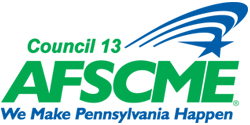Bill Tracker
State Retiree COLA
Posted on December 11, 2023
AFSCME Council 13 applauds the passage of House Bill 1416 by the Pennsylvania House of Representatives, which brings tens of thousands of state retirees one step closer to a much-needed pension boost.
“Our commonwealth’s retirees have gone more than 20 years without a Cost-Of-Living Adjustment (COLA), so to call this bill ‘long overdue’ would be an understatement. The onus is now on the State Senate to do the right thing and ensure this group of senior citizens who devoted their working lives to public service gets a much-needed raise,” Executive Director David Henderson said.
Under the bill, an estimated 69,000 pensioners who retired before 2001 would see an average annual bump in their pensions of a couple hundred dollars a month. More than 25,000 retirees from state government would see an average annual increase of $2,240 in the first year while roughly 43,500 retirees from public schools would see an average annual increase of $3,040 in the first year.
Council 13 and its retiree chapter have advocated for a COLA for state retirees for many years and intend to keep up the pressure to turn this bill into law. We urge all members, retirees, and Pennsylvania citizens, to call their state senators and urge them to pass House Bill 1416.
Public Sector OSHA
Posted on December 11, 2023
House Bill 299 passed in the Pennsylvania House of Representatives by a vote of 116-85 on Tuesday, May 2, 2023, bringing Pennsylvania’s public employees one step closer to being covered by the same protections that private sector workers enjoy under the Occupational Health and Safety Act (OSHA).
“AFSCME Council 13 members have fought alongside their fellow workers on this issue for decades now, and we are thankful to finally see some meaningful progress,” AFSCME Council 13 Executive Director Henderson said following the passage of HB 299.
“This is a major victory, but as always, there is more work to do.”
The bill now goes to the State Senate, and AFSCME members intend to keep the pressure on lawmakers to get this overdue policy on the governor’s desk.
There is no price on human life, and the cost of not passing this bill is far greater than any dollar amount.
Just the week before, a member of AFSCME Local 2835 working for the Schuylkill Municipal Authority was killed on the job – that member’s family deserves a proper investigation, and all workers deserve maximum efforts to ensure such a tragedy can never happen again. If that worker had been doing the same kind of work for a private contractor, they would have been covered by OSHA.
Council 13 urges Pennsylvanians to make their voices heard and let state senators know that we can no longer treat public sector workers like second class citizens, and we must ensure they have the same basic protections as others.
Minimum Wage Increase
Posted on December 11, 2023
Pennsylvania’s minimum hourly wage has been stuck at $7.25 since 2009. This is an unlivable poverty wage that must be increased immediately.
Health Care Facilities Act
Posted on December 11, 2023
This bill would amend the Health Care Facilities Act to provide for hospital patient protection provisions and imposing penalties.
Right to Organize and Collectively Bargain
Posted on December 11, 2023
This bill would enshrine workers’ fundamental right to organize a union and collectively bargain in the Pennsylvania Constitution. The bill mirrors a constitutional amendment that voters approved in Illinois.
County Retiree COLA
Posted on December 11, 2023
Much like Commonwealth Retirees, senior citizens who devoted their working lives to public service at the county level deserve adequate Cost-Of-Living Adjustments (COLA).
Attack on Collective Bargaining Rights
Posted on December 11, 2023
This bill is an attack on collective bargaining rights under the guise of transparency. It would require notice and disclosure of proposed CBAs and related documents. This would have to be done for every collectively bargained contract.
